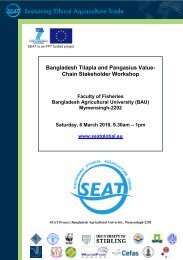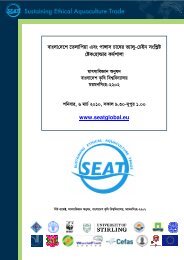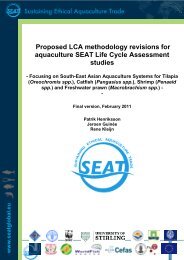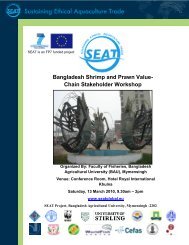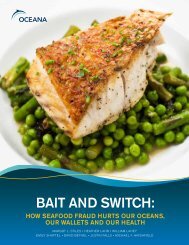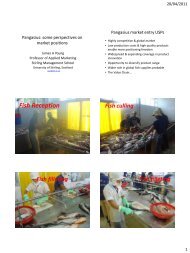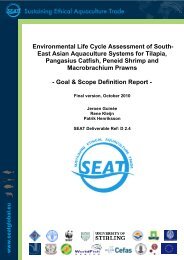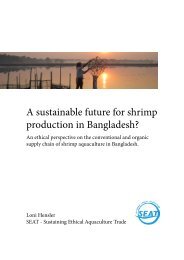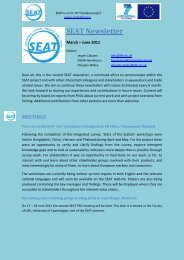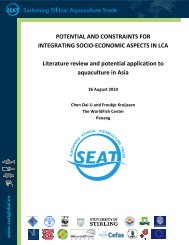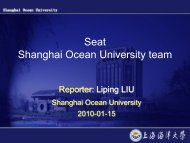Sustaining Ethical Aquaculture Trade - SEAT Global
Sustaining Ethical Aquaculture Trade - SEAT Global
Sustaining Ethical Aquaculture Trade - SEAT Global
Create successful ePaper yourself
Turn your PDF publications into a flip-book with our unique Google optimized e-Paper software.
www.seatglobal.eu<br />
<strong>Sustaining</strong> <strong>Ethical</strong> <strong>Aquaculture</strong><br />
<strong>Trade</strong><br />
FP7 –KBBE-2007-2A<br />
FP7 Cooperation Work Programme:<br />
Theme 2 – Food, Agriculture and<br />
Fisheries, and Biotechnology
www.seatglobal.eu<br />
<strong>SEAT</strong> Consortium – Asia Country<br />
Partners<br />
1. Thailand: Kasetsart University:<br />
2. China: Shanghai Fisheries University<br />
3. Vietnam: Can Tho University, <strong>Aquaculture</strong><br />
and Fisheries<br />
4. Bangladesh: Bangladesh Agricultural<br />
University
www.seatglobal.eu<br />
<strong>SEAT</strong> Consortium - EU<br />
1. University of Stirling (UK) – <strong>Aquaculture</strong> systems,<br />
environmental modelling, Marketing<br />
2. CEFAS Fish disease Lab (UK) – EU Policy<br />
3. University of Copenhagen (DK)- Veterinary<br />
Pathobiology & Public Health<br />
4. Wageningen University (NL) - Ecotoxicology<br />
5. Leiden University (BG) – Life Cycle Analysis<br />
6. Bergen University (NO) - Ethics<br />
7. Danish Inst. for International Studies (DK) – Political<br />
economy & global value chains
www.seatglobal.eu<br />
<strong>SEAT</strong> Consortium - International<br />
1. World Wildlife Fund:<br />
(Pangasius <strong>Aquaculture</strong> Dialogue)<br />
2. World Fish Center, Dept. Policy Economics<br />
and Social Science<br />
3. FAO: Institute for Fish Utilisation and <strong>Trade</strong>
www.seatglobal.eu<br />
Background and Objectives<br />
• Seafood trade - highest value food sector<br />
• Asia main EU supply – rapid growth<br />
• EU standards: food safety, (animal welfare)<br />
• Market standards: environmental, social<br />
• Harmonisation?<br />
• Evidence-based multidisciplinary approach<br />
• <strong>Ethical</strong> Aquatic Food Index (EAFI)
www.seatglobal.eu<br />
Rayner, 2009
www.seatglobal.eu<br />
Country/<br />
Species<br />
Project Scope<br />
Tilapia<br />
Pangasi<br />
us<br />
Catfish<br />
Marine<br />
Shrimp<br />
Freshwate<br />
r Prawns<br />
China √√ √ √ ?<br />
Vietnam √ √√ √√ (√)<br />
Thailand √ √ √√ √<br />
Bangladesh (√) √ √√ √√<br />
Europe (√) (o) (o) (o)
www.seatglobal.eu<br />
Emergent ‘seafood’ commodities<br />
Giant Freshwater prawn Striped river catfish
www.seatglobal.eu<br />
From discounted domestic product to<br />
export value-add<br />
Tilapia
www.seatglobal.eu<br />
Penaeus monodon<br />
Local or foreign?<br />
Penaeus vannamei
www.seatglobal.eu<br />
Overall Objectives<br />
• Interdisciplinary understanding of emergent<br />
Asian aquatic food chains<br />
• Develop improved/ transparent measures of<br />
sustainability for target production systems<br />
(EAFI).<br />
• Enhance sustainability & ethical ‘values’ of four<br />
major aquatic food commodities through action<br />
research<br />
• Enhance farmed seafood, scientific, business and<br />
policy linkages between Asia and Europe
www.seatglobal.eu<br />
Research<br />
Action<br />
LEI WFC UCPH WU<br />
KU CTU SOU BAU<br />
Europe Stakeholders Asia<br />
CEFAS UiB WWF<br />
FAO<br />
DIIS<br />
UOS
www.seatglobal.eu<br />
Work Packages<br />
• Systems analysis<br />
• Life Cycle Analysis (LCA)<br />
• Environmental & contaminants modelling<br />
• Food safety and public health<br />
• Social and economic issues<br />
• Action research with SMEs<br />
• Certification dialogue<br />
• GVCs & access asymmetries<br />
• <strong>Ethical</strong> matrix assessment
www.seatglobal.eu<br />
Demand for <strong>Aquaculture</strong> Products<br />
(FAO Food Outlook 2008)<br />
Per caput food<br />
consumption: kg/year<br />
2005 2006 2007<br />
07/06<br />
%+<br />
Food fish 16.7 17.2 17.4 1.2<br />
From capture fisheries 9.3 9.5 9.5 0.0<br />
From aquaculture 7.4 7.7 7.9 2.6
www.seatglobal.eu<br />
Vietnam Pangasius Exports<br />
2001-2006 (42% CAGR)
www.seatglobal.eu<br />
Comparative advantage
www.seatglobal.eu<br />
Local subsistence to global value chain
www.seatglobal.eu<br />
1,400,000<br />
1,200,000<br />
1,000,000<br />
800,000<br />
600,000<br />
400,000<br />
200,000<br />
0<br />
Peneid Shrimp<br />
48% of shrimp from <strong>Aquaculture</strong><br />
SE Asia China S Asia Americas Af/ME<br />
2000 2001 2002 2003 2004 2005 2006<br />
China<br />
Thailand<br />
Vietnam<br />
Indonesia<br />
India<br />
Ecuador<br />
Mexico<br />
Brazil<br />
127,864<br />
136,110<br />
103,067<br />
65,000<br />
226,640<br />
353,000<br />
472,000<br />
1,003,987<br />
0 200,000 400,000 600,000 800,000 1,000,000 1,200,000<br />
1,213,063 MT<br />
12%<br />
940,671 MT<br />
28%<br />
414,227 MT<br />
18%<br />
197,135 MT<br />
4%<br />
35,700 MT<br />
21%
www.seatglobal.eu<br />
Black Tiger & White Shrimp aquaculture<br />
in TH, VN and ID<br />
400<br />
300<br />
200<br />
100<br />
0<br />
2000 2002 2004 2006<br />
Indonesia Thailand Vietnam<br />
500<br />
400<br />
300<br />
200<br />
100<br />
0<br />
2000 2002 2004 2006
www.seatglobal.eu<br />
Sustainability<br />
• Sustainability<br />
– weak and strong<br />
– production to consumption<br />
• <strong>Ethical</strong> consumption<br />
– power relations in producer countries and<br />
between consumer and producer networks<br />
• Standards setting and certification-major<br />
issues
www.seatglobal.eu<br />
• Food safety as given<br />
Qualities<br />
• A host of ethical and sometimes contradictory<br />
qualities<br />
• Deliverable by smaller- scale producers?<br />
• Optimising benefits to poorer actors<br />
• Certification as entry barriers
www.seatglobal.eu<br />
Reducing risks of global trade<br />
• Trends to consolidation<br />
• Continued importance of family enterprises<br />
and MSMES<br />
• Clusters of enterprises-<br />
– environmental impacts<br />
– health management issues<br />
– BUT accessibility to producers
www.seatglobal.eu<br />
Challenges<br />
• Increasing trust among consumers<br />
• A ‘sustainability’ and ‘QC’ culture among<br />
producers<br />
• Asymmetries in information flows<br />
• Support a move away from single interest<br />
standards<br />
• Two way responsibilities of consumers and<br />
producers



